MAA250: Ethics for Financial Professionals Case Study Analysis
VerifiedAdded on 2022/11/17
|13
|2810
|259
Case Study
AI Summary
This case study analysis examines ethical issues within the context of the Geelong Council, focusing on the role of Nimish, a graduate recruit, and the ethical challenges faced by various council teams. The analysis delves into financial ethics, ethical boundaries, principles like objectivity and confidentiality, and the impact of unethical behavior. The study explores the ethical dilemmas faced by financial professionals and the importance of adhering to financial regulations and laws. It identifies potential courses of action to address ethical problems, such as restructuring financial sectors, conducting in-depth research, and identifying affected parties. The analysis also highlights the best course of action, which involves following ethical principles and virtues in decision-making. The responsibilities of a financial professional are also outlined, including market research, strategy development, execution, and monitoring, all aimed at providing sound financial advice and mitigating financial risks. The case study underscores the importance of ethical conduct in the financial sector and its impact on individuals, entities, and the broader community.
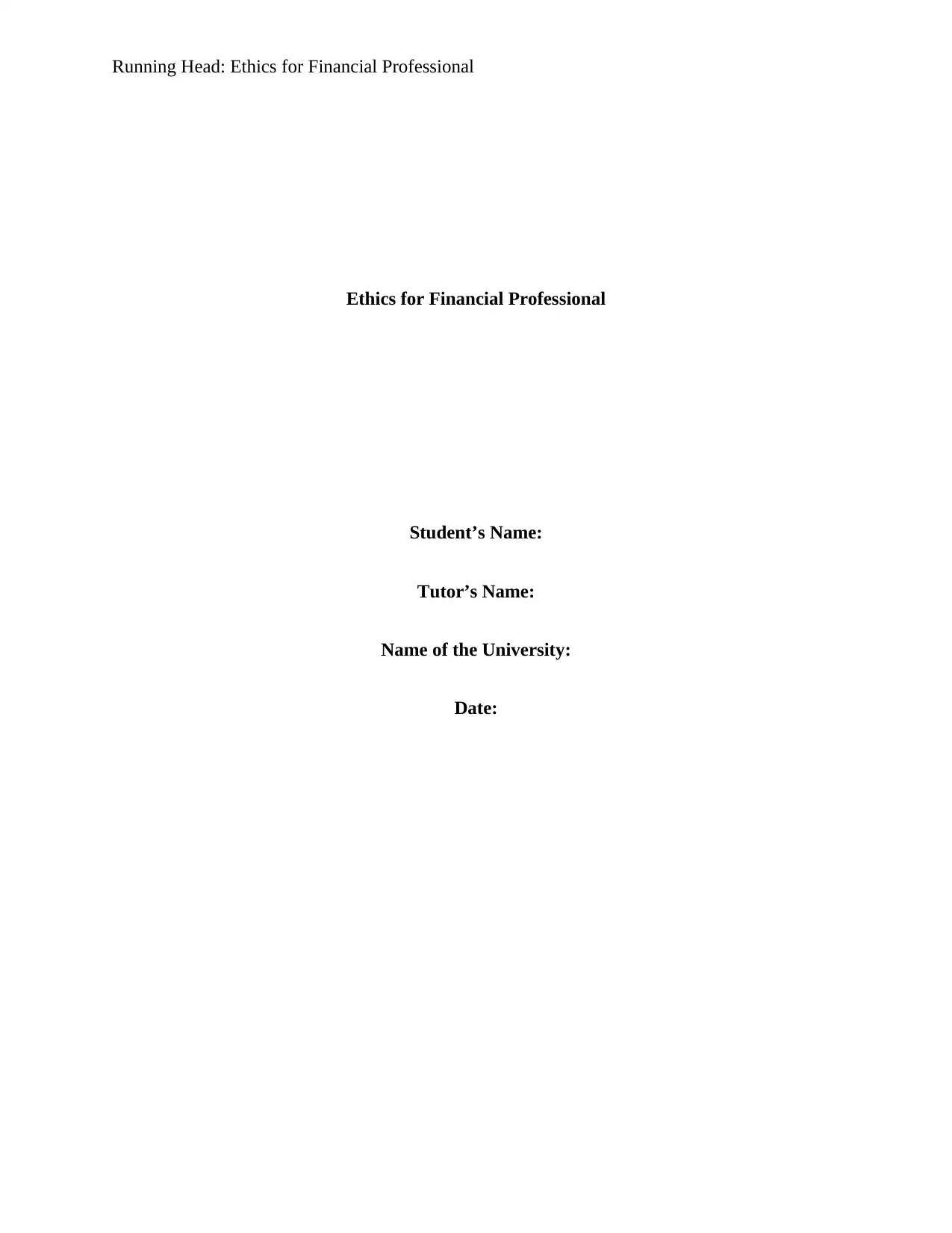
Running Head: Ethics for Financial Professional
Ethics for Financial Professional
Student’s Name:
Tutor’s Name:
Name of the University:
Date:
Ethics for Financial Professional
Student’s Name:
Tutor’s Name:
Name of the University:
Date:
Paraphrase This Document
Need a fresh take? Get an instant paraphrase of this document with our AI Paraphraser
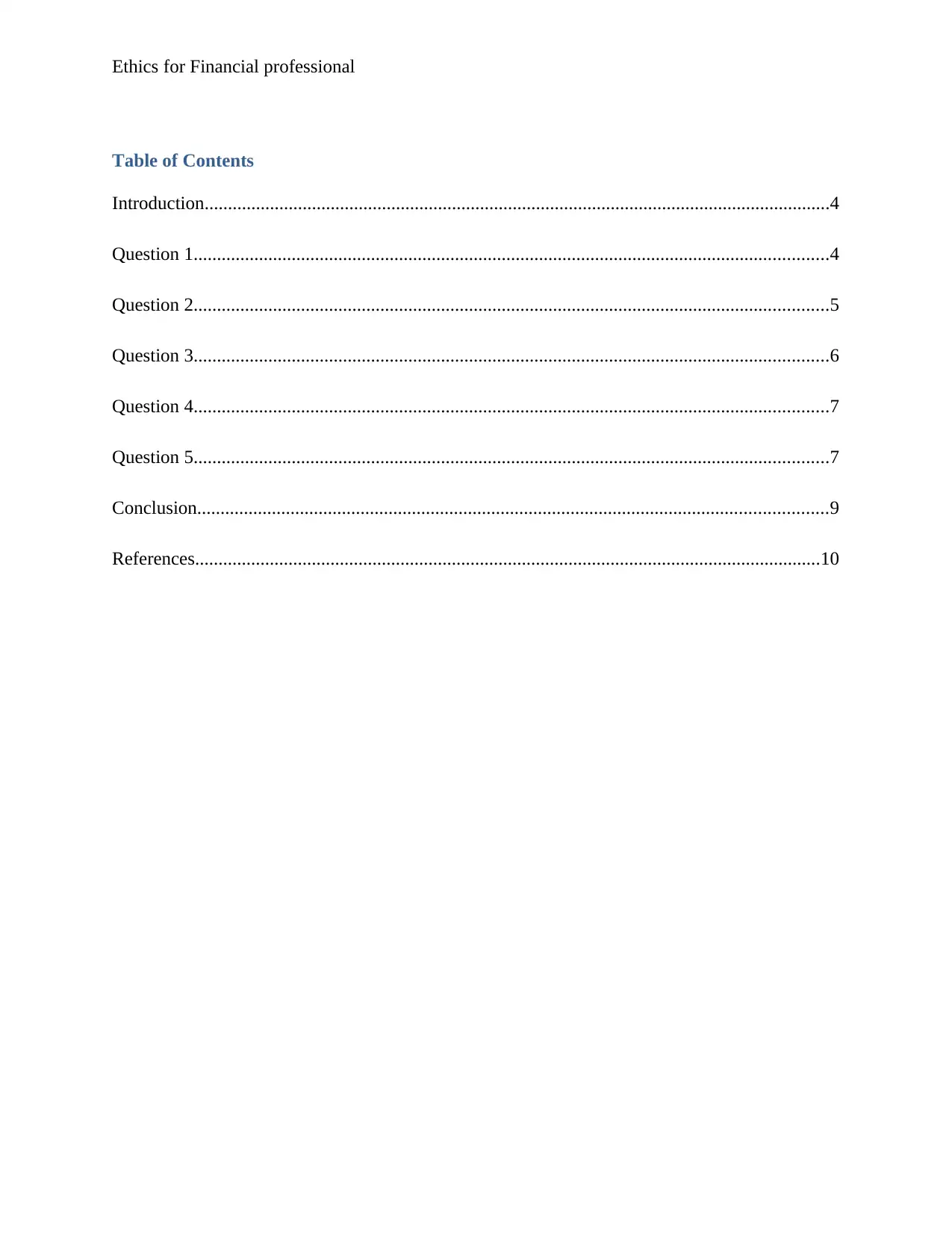
Ethics for Financial professional
Table of Contents
Introduction......................................................................................................................................4
Question 1........................................................................................................................................4
Question 2........................................................................................................................................5
Question 3........................................................................................................................................6
Question 4........................................................................................................................................7
Question 5........................................................................................................................................7
Conclusion.......................................................................................................................................9
References......................................................................................................................................10
Table of Contents
Introduction......................................................................................................................................4
Question 1........................................................................................................................................4
Question 2........................................................................................................................................5
Question 3........................................................................................................................................6
Question 4........................................................................................................................................7
Question 5........................................................................................................................................7
Conclusion.......................................................................................................................................9
References......................................................................................................................................10
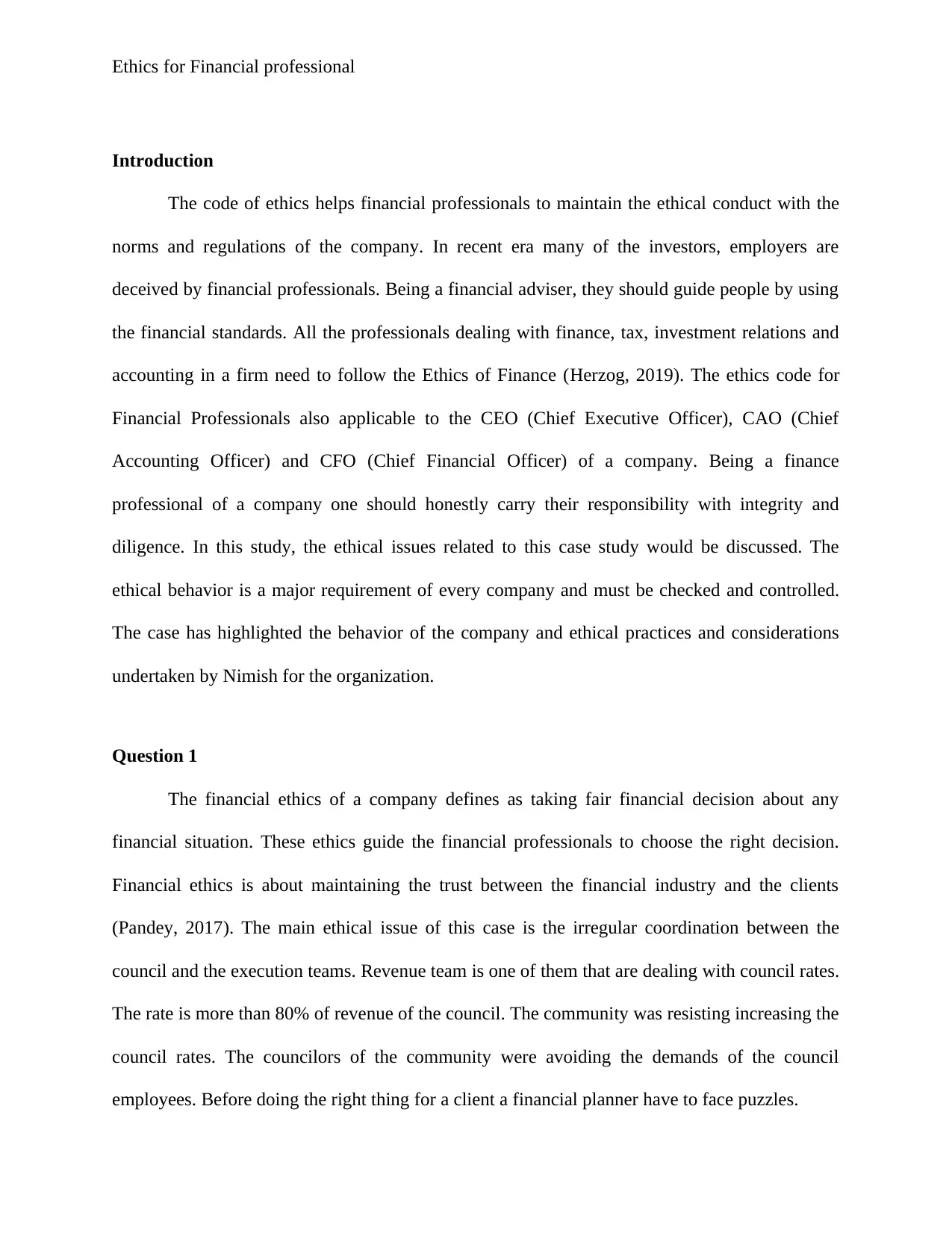
Ethics for Financial professional
Introduction
The code of ethics helps financial professionals to maintain the ethical conduct with the
norms and regulations of the company. In recent era many of the investors, employers are
deceived by financial professionals. Being a financial adviser, they should guide people by using
the financial standards. All the professionals dealing with finance, tax, investment relations and
accounting in a firm need to follow the Ethics of Finance (Herzog, 2019). The ethics code for
Financial Professionals also applicable to the CEO (Chief Executive Officer), CAO (Chief
Accounting Officer) and CFO (Chief Financial Officer) of a company. Being a finance
professional of a company one should honestly carry their responsibility with integrity and
diligence. In this study, the ethical issues related to this case study would be discussed. The
ethical behavior is a major requirement of every company and must be checked and controlled.
The case has highlighted the behavior of the company and ethical practices and considerations
undertaken by Nimish for the organization.
Question 1
The financial ethics of a company defines as taking fair financial decision about any
financial situation. These ethics guide the financial professionals to choose the right decision.
Financial ethics is about maintaining the trust between the financial industry and the clients
(Pandey, 2017). The main ethical issue of this case is the irregular coordination between the
council and the execution teams. Revenue team is one of them that are dealing with council rates.
The rate is more than 80% of revenue of the council. The community was resisting increasing the
council rates. The councilors of the community were avoiding the demands of the council
employees. Before doing the right thing for a client a financial planner have to face puzzles.
Introduction
The code of ethics helps financial professionals to maintain the ethical conduct with the
norms and regulations of the company. In recent era many of the investors, employers are
deceived by financial professionals. Being a financial adviser, they should guide people by using
the financial standards. All the professionals dealing with finance, tax, investment relations and
accounting in a firm need to follow the Ethics of Finance (Herzog, 2019). The ethics code for
Financial Professionals also applicable to the CEO (Chief Executive Officer), CAO (Chief
Accounting Officer) and CFO (Chief Financial Officer) of a company. Being a finance
professional of a company one should honestly carry their responsibility with integrity and
diligence. In this study, the ethical issues related to this case study would be discussed. The
ethical behavior is a major requirement of every company and must be checked and controlled.
The case has highlighted the behavior of the company and ethical practices and considerations
undertaken by Nimish for the organization.
Question 1
The financial ethics of a company defines as taking fair financial decision about any
financial situation. These ethics guide the financial professionals to choose the right decision.
Financial ethics is about maintaining the trust between the financial industry and the clients
(Pandey, 2017). The main ethical issue of this case is the irregular coordination between the
council and the execution teams. Revenue team is one of them that are dealing with council rates.
The rate is more than 80% of revenue of the council. The community was resisting increasing the
council rates. The councilors of the community were avoiding the demands of the council
employees. Before doing the right thing for a client a financial planner have to face puzzles.
⊘ This is a preview!⊘
Do you want full access?
Subscribe today to unlock all pages.

Trusted by 1+ million students worldwide
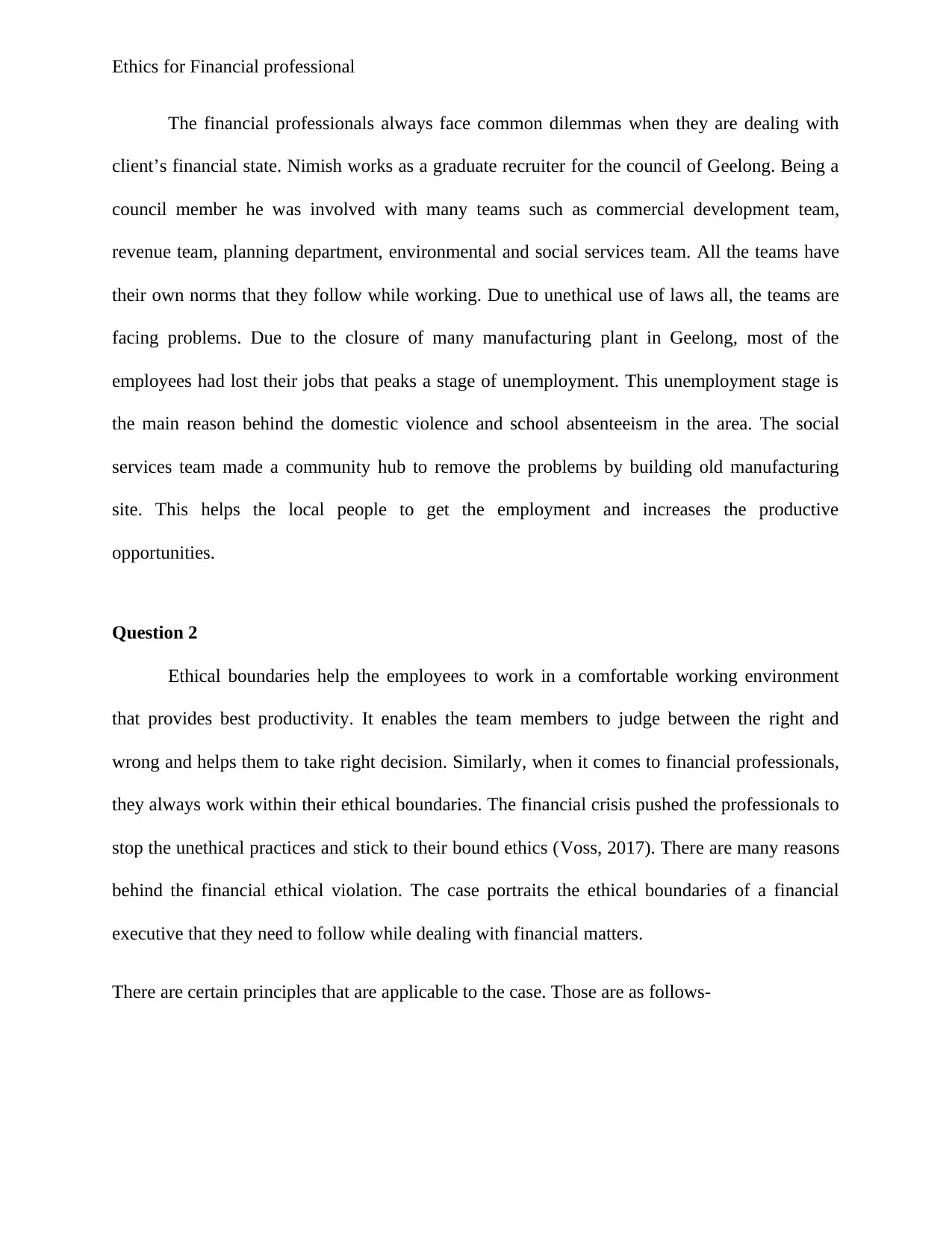
Ethics for Financial professional
The financial professionals always face common dilemmas when they are dealing with
client’s financial state. Nimish works as a graduate recruiter for the council of Geelong. Being a
council member he was involved with many teams such as commercial development team,
revenue team, planning department, environmental and social services team. All the teams have
their own norms that they follow while working. Due to unethical use of laws all, the teams are
facing problems. Due to the closure of many manufacturing plant in Geelong, most of the
employees had lost their jobs that peaks a stage of unemployment. This unemployment stage is
the main reason behind the domestic violence and school absenteeism in the area. The social
services team made a community hub to remove the problems by building old manufacturing
site. This helps the local people to get the employment and increases the productive
opportunities.
Question 2
Ethical boundaries help the employees to work in a comfortable working environment
that provides best productivity. It enables the team members to judge between the right and
wrong and helps them to take right decision. Similarly, when it comes to financial professionals,
they always work within their ethical boundaries. The financial crisis pushed the professionals to
stop the unethical practices and stick to their bound ethics (Voss, 2017). There are many reasons
behind the financial ethical violation. The case portraits the ethical boundaries of a financial
executive that they need to follow while dealing with financial matters.
There are certain principles that are applicable to the case. Those are as follows-
The financial professionals always face common dilemmas when they are dealing with
client’s financial state. Nimish works as a graduate recruiter for the council of Geelong. Being a
council member he was involved with many teams such as commercial development team,
revenue team, planning department, environmental and social services team. All the teams have
their own norms that they follow while working. Due to unethical use of laws all, the teams are
facing problems. Due to the closure of many manufacturing plant in Geelong, most of the
employees had lost their jobs that peaks a stage of unemployment. This unemployment stage is
the main reason behind the domestic violence and school absenteeism in the area. The social
services team made a community hub to remove the problems by building old manufacturing
site. This helps the local people to get the employment and increases the productive
opportunities.
Question 2
Ethical boundaries help the employees to work in a comfortable working environment
that provides best productivity. It enables the team members to judge between the right and
wrong and helps them to take right decision. Similarly, when it comes to financial professionals,
they always work within their ethical boundaries. The financial crisis pushed the professionals to
stop the unethical practices and stick to their bound ethics (Voss, 2017). There are many reasons
behind the financial ethical violation. The case portraits the ethical boundaries of a financial
executive that they need to follow while dealing with financial matters.
There are certain principles that are applicable to the case. Those are as follows-
Paraphrase This Document
Need a fresh take? Get an instant paraphrase of this document with our AI Paraphraser
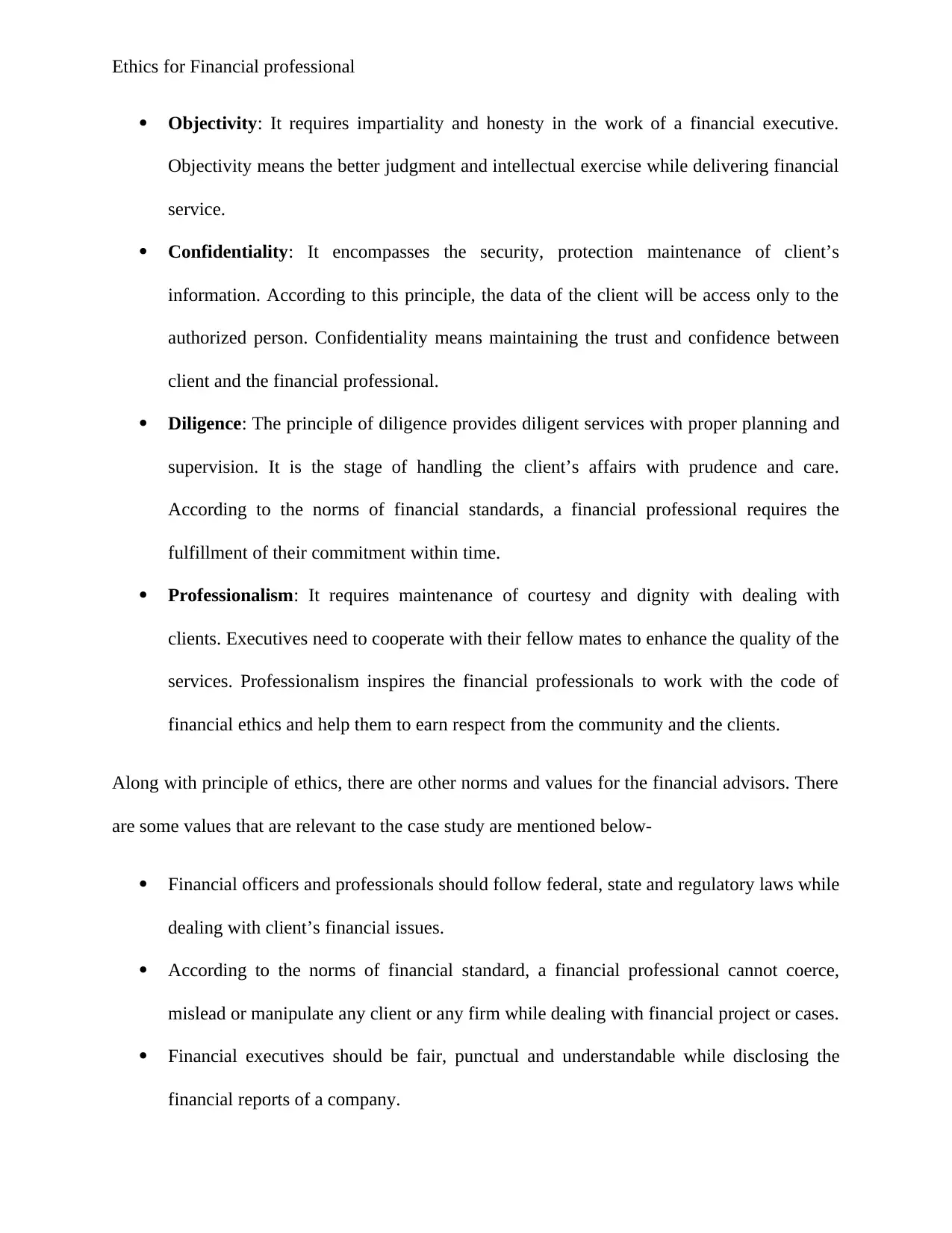
Ethics for Financial professional
Objectivity: It requires impartiality and honesty in the work of a financial executive.
Objectivity means the better judgment and intellectual exercise while delivering financial
service.
Confidentiality: It encompasses the security, protection maintenance of client’s
information. According to this principle, the data of the client will be access only to the
authorized person. Confidentiality means maintaining the trust and confidence between
client and the financial professional.
Diligence: The principle of diligence provides diligent services with proper planning and
supervision. It is the stage of handling the client’s affairs with prudence and care.
According to the norms of financial standards, a financial professional requires the
fulfillment of their commitment within time.
Professionalism: It requires maintenance of courtesy and dignity with dealing with
clients. Executives need to cooperate with their fellow mates to enhance the quality of the
services. Professionalism inspires the financial professionals to work with the code of
financial ethics and help them to earn respect from the community and the clients.
Along with principle of ethics, there are other norms and values for the financial advisors. There
are some values that are relevant to the case study are mentioned below-
Financial officers and professionals should follow federal, state and regulatory laws while
dealing with client’s financial issues.
According to the norms of financial standard, a financial professional cannot coerce,
mislead or manipulate any client or any firm while dealing with financial project or cases.
Financial executives should be fair, punctual and understandable while disclosing the
financial reports of a company.
Objectivity: It requires impartiality and honesty in the work of a financial executive.
Objectivity means the better judgment and intellectual exercise while delivering financial
service.
Confidentiality: It encompasses the security, protection maintenance of client’s
information. According to this principle, the data of the client will be access only to the
authorized person. Confidentiality means maintaining the trust and confidence between
client and the financial professional.
Diligence: The principle of diligence provides diligent services with proper planning and
supervision. It is the stage of handling the client’s affairs with prudence and care.
According to the norms of financial standards, a financial professional requires the
fulfillment of their commitment within time.
Professionalism: It requires maintenance of courtesy and dignity with dealing with
clients. Executives need to cooperate with their fellow mates to enhance the quality of the
services. Professionalism inspires the financial professionals to work with the code of
financial ethics and help them to earn respect from the community and the clients.
Along with principle of ethics, there are other norms and values for the financial advisors. There
are some values that are relevant to the case study are mentioned below-
Financial officers and professionals should follow federal, state and regulatory laws while
dealing with client’s financial issues.
According to the norms of financial standard, a financial professional cannot coerce,
mislead or manipulate any client or any firm while dealing with financial project or cases.
Financial executives should be fair, punctual and understandable while disclosing the
financial reports of a company.
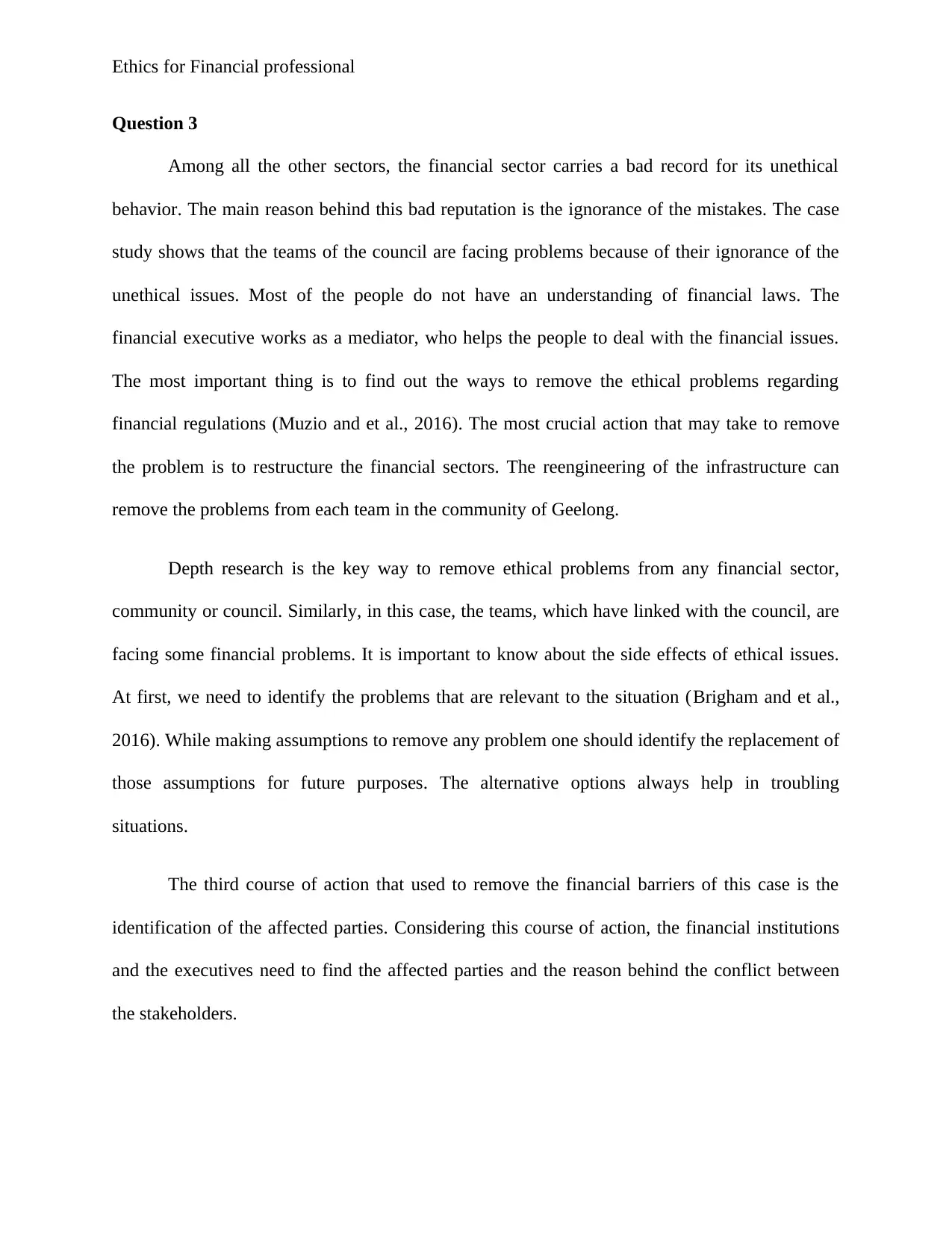
Ethics for Financial professional
Question 3
Among all the other sectors, the financial sector carries a bad record for its unethical
behavior. The main reason behind this bad reputation is the ignorance of the mistakes. The case
study shows that the teams of the council are facing problems because of their ignorance of the
unethical issues. Most of the people do not have an understanding of financial laws. The
financial executive works as a mediator, who helps the people to deal with the financial issues.
The most important thing is to find out the ways to remove the ethical problems regarding
financial regulations (Muzio and et al., 2016). The most crucial action that may take to remove
the problem is to restructure the financial sectors. The reengineering of the infrastructure can
remove the problems from each team in the community of Geelong.
Depth research is the key way to remove ethical problems from any financial sector,
community or council. Similarly, in this case, the teams, which have linked with the council, are
facing some financial problems. It is important to know about the side effects of ethical issues.
At first, we need to identify the problems that are relevant to the situation (Brigham and et al.,
2016). While making assumptions to remove any problem one should identify the replacement of
those assumptions for future purposes. The alternative options always help in troubling
situations.
The third course of action that used to remove the financial barriers of this case is the
identification of the affected parties. Considering this course of action, the financial institutions
and the executives need to find the affected parties and the reason behind the conflict between
the stakeholders.
Question 3
Among all the other sectors, the financial sector carries a bad record for its unethical
behavior. The main reason behind this bad reputation is the ignorance of the mistakes. The case
study shows that the teams of the council are facing problems because of their ignorance of the
unethical issues. Most of the people do not have an understanding of financial laws. The
financial executive works as a mediator, who helps the people to deal with the financial issues.
The most important thing is to find out the ways to remove the ethical problems regarding
financial regulations (Muzio and et al., 2016). The most crucial action that may take to remove
the problem is to restructure the financial sectors. The reengineering of the infrastructure can
remove the problems from each team in the community of Geelong.
Depth research is the key way to remove ethical problems from any financial sector,
community or council. Similarly, in this case, the teams, which have linked with the council, are
facing some financial problems. It is important to know about the side effects of ethical issues.
At first, we need to identify the problems that are relevant to the situation (Brigham and et al.,
2016). While making assumptions to remove any problem one should identify the replacement of
those assumptions for future purposes. The alternative options always help in troubling
situations.
The third course of action that used to remove the financial barriers of this case is the
identification of the affected parties. Considering this course of action, the financial institutions
and the executives need to find the affected parties and the reason behind the conflict between
the stakeholders.
⊘ This is a preview!⊘
Do you want full access?
Subscribe today to unlock all pages.

Trusted by 1+ million students worldwide
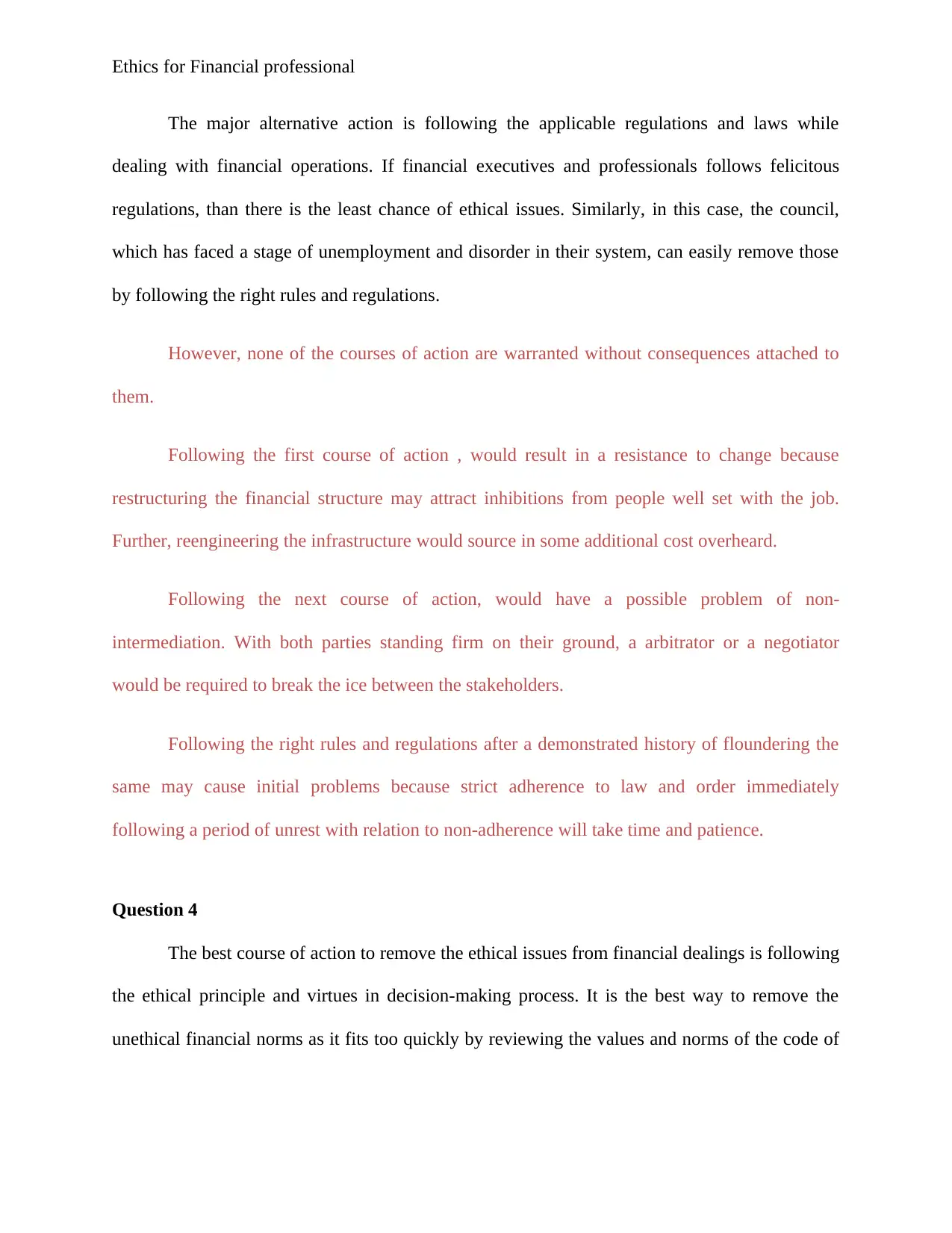
Ethics for Financial professional
The major alternative action is following the applicable regulations and laws while
dealing with financial operations. If financial executives and professionals follows felicitous
regulations, than there is the least chance of ethical issues. Similarly, in this case, the council,
which has faced a stage of unemployment and disorder in their system, can easily remove those
by following the right rules and regulations.
However, none of the courses of action are warranted without consequences attached to
them.
Following the first course of action , would result in a resistance to change because
restructuring the financial structure may attract inhibitions from people well set with the job.
Further, reengineering the infrastructure would source in some additional cost overheard.
Following the next course of action, would have a possible problem of non-
intermediation. With both parties standing firm on their ground, a arbitrator or a negotiator
would be required to break the ice between the stakeholders.
Following the right rules and regulations after a demonstrated history of floundering the
same may cause initial problems because strict adherence to law and order immediately
following a period of unrest with relation to non-adherence will take time and patience.
Question 4
The best course of action to remove the ethical issues from financial dealings is following
the ethical principle and virtues in decision-making process. It is the best way to remove the
unethical financial norms as it fits too quickly by reviewing the values and norms of the code of
The major alternative action is following the applicable regulations and laws while
dealing with financial operations. If financial executives and professionals follows felicitous
regulations, than there is the least chance of ethical issues. Similarly, in this case, the council,
which has faced a stage of unemployment and disorder in their system, can easily remove those
by following the right rules and regulations.
However, none of the courses of action are warranted without consequences attached to
them.
Following the first course of action , would result in a resistance to change because
restructuring the financial structure may attract inhibitions from people well set with the job.
Further, reengineering the infrastructure would source in some additional cost overheard.
Following the next course of action, would have a possible problem of non-
intermediation. With both parties standing firm on their ground, a arbitrator or a negotiator
would be required to break the ice between the stakeholders.
Following the right rules and regulations after a demonstrated history of floundering the
same may cause initial problems because strict adherence to law and order immediately
following a period of unrest with relation to non-adherence will take time and patience.
Question 4
The best course of action to remove the ethical issues from financial dealings is following
the ethical principle and virtues in decision-making process. It is the best way to remove the
unethical financial norms as it fits too quickly by reviewing the values and norms of the code of
Paraphrase This Document
Need a fresh take? Get an instant paraphrase of this document with our AI Paraphraser
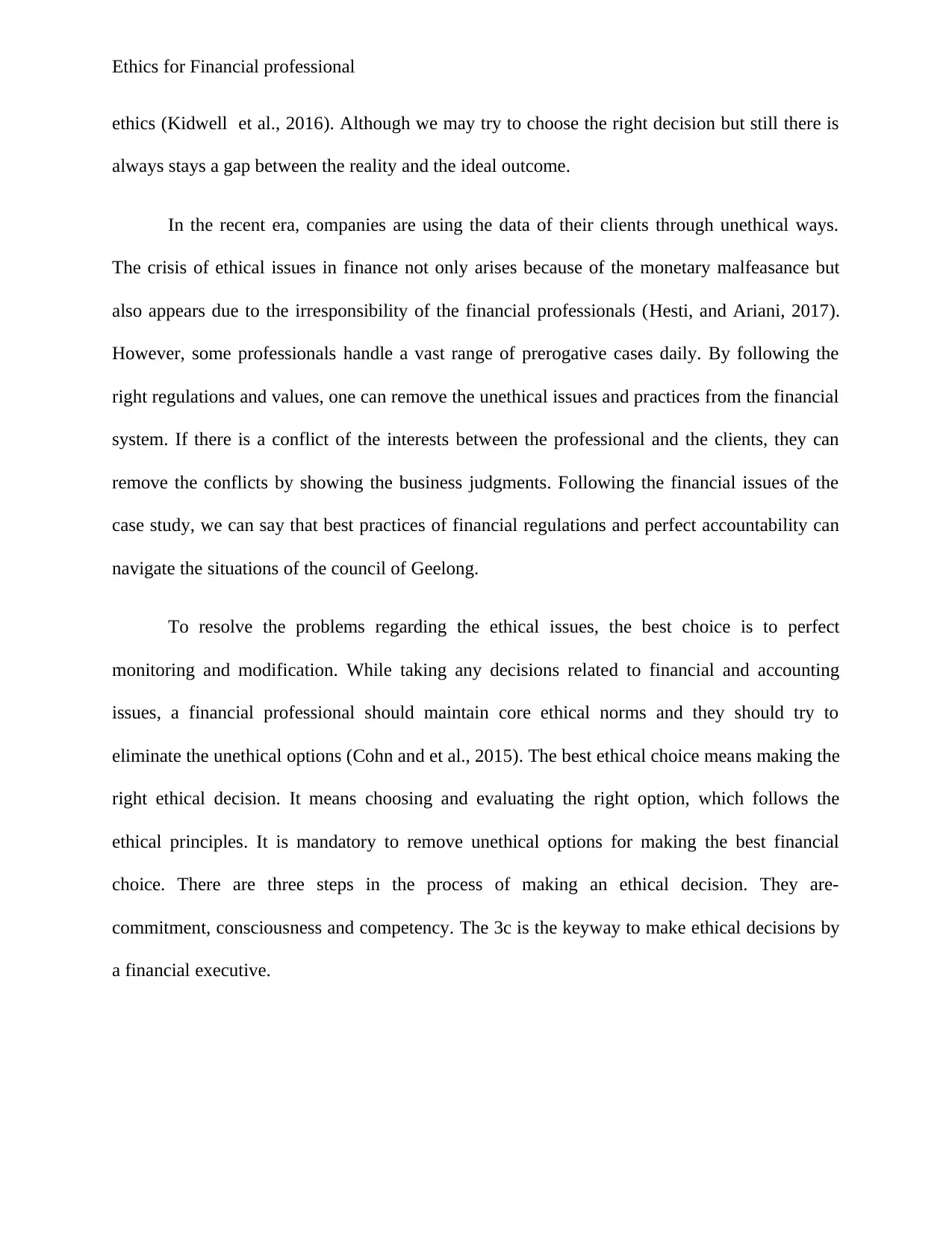
Ethics for Financial professional
ethics (Kidwell et al., 2016). Although we may try to choose the right decision but still there is
always stays a gap between the reality and the ideal outcome.
In the recent era, companies are using the data of their clients through unethical ways.
The crisis of ethical issues in finance not only arises because of the monetary malfeasance but
also appears due to the irresponsibility of the financial professionals (Hesti, and Ariani, 2017).
However, some professionals handle a vast range of prerogative cases daily. By following the
right regulations and values, one can remove the unethical issues and practices from the financial
system. If there is a conflict of the interests between the professional and the clients, they can
remove the conflicts by showing the business judgments. Following the financial issues of the
case study, we can say that best practices of financial regulations and perfect accountability can
navigate the situations of the council of Geelong.
To resolve the problems regarding the ethical issues, the best choice is to perfect
monitoring and modification. While taking any decisions related to financial and accounting
issues, a financial professional should maintain core ethical norms and they should try to
eliminate the unethical options (Cohn and et al., 2015). The best ethical choice means making the
right ethical decision. It means choosing and evaluating the right option, which follows the
ethical principles. It is mandatory to remove unethical options for making the best financial
choice. There are three steps in the process of making an ethical decision. They are-
commitment, consciousness and competency. The 3c is the keyway to make ethical decisions by
a financial executive.
ethics (Kidwell et al., 2016). Although we may try to choose the right decision but still there is
always stays a gap between the reality and the ideal outcome.
In the recent era, companies are using the data of their clients through unethical ways.
The crisis of ethical issues in finance not only arises because of the monetary malfeasance but
also appears due to the irresponsibility of the financial professionals (Hesti, and Ariani, 2017).
However, some professionals handle a vast range of prerogative cases daily. By following the
right regulations and values, one can remove the unethical issues and practices from the financial
system. If there is a conflict of the interests between the professional and the clients, they can
remove the conflicts by showing the business judgments. Following the financial issues of the
case study, we can say that best practices of financial regulations and perfect accountability can
navigate the situations of the council of Geelong.
To resolve the problems regarding the ethical issues, the best choice is to perfect
monitoring and modification. While taking any decisions related to financial and accounting
issues, a financial professional should maintain core ethical norms and they should try to
eliminate the unethical options (Cohn and et al., 2015). The best ethical choice means making the
right ethical decision. It means choosing and evaluating the right option, which follows the
ethical principles. It is mandatory to remove unethical options for making the best financial
choice. There are three steps in the process of making an ethical decision. They are-
commitment, consciousness and competency. The 3c is the keyway to make ethical decisions by
a financial executive.
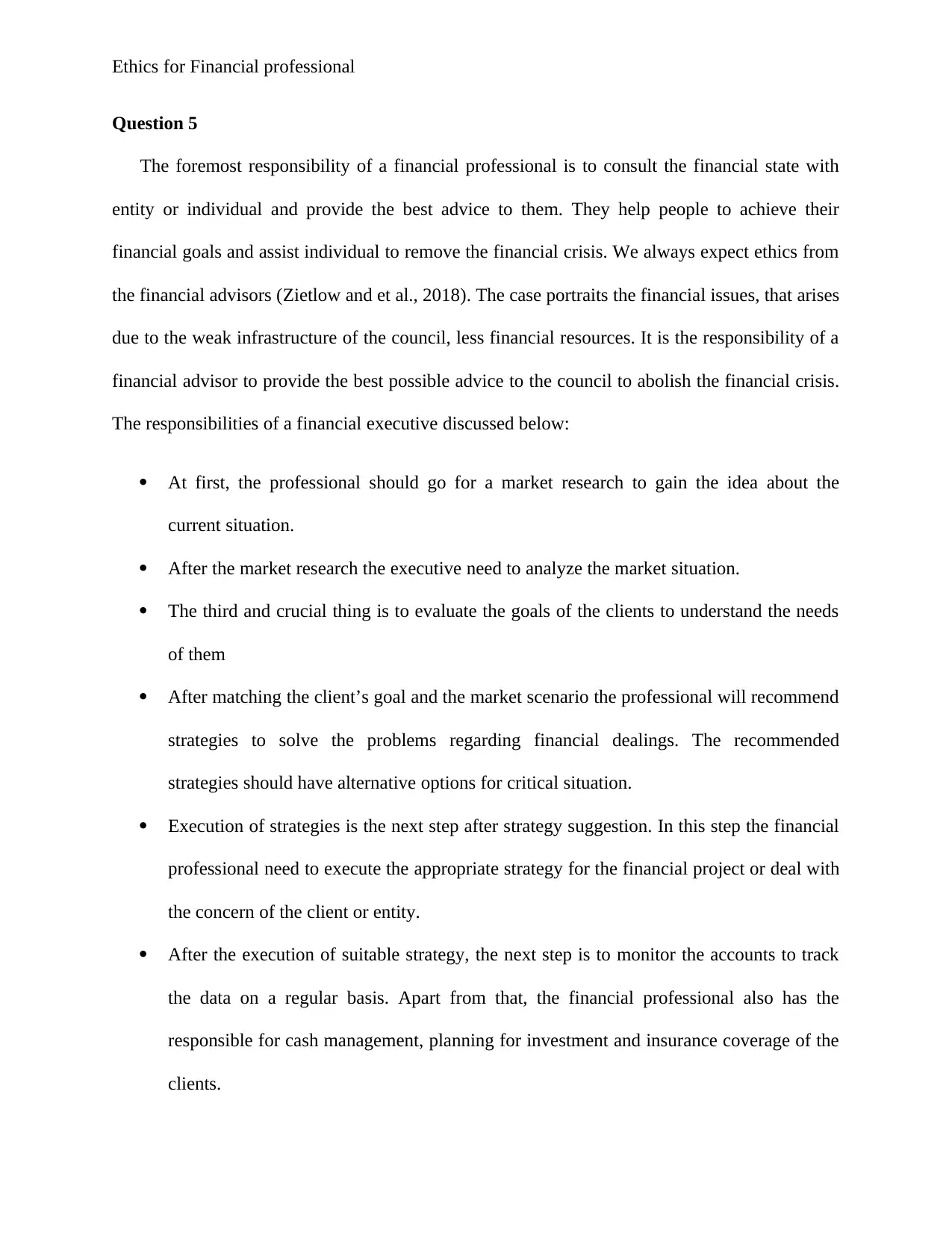
Ethics for Financial professional
Question 5
The foremost responsibility of a financial professional is to consult the financial state with
entity or individual and provide the best advice to them. They help people to achieve their
financial goals and assist individual to remove the financial crisis. We always expect ethics from
the financial advisors (Zietlow and et al., 2018). The case portraits the financial issues, that arises
due to the weak infrastructure of the council, less financial resources. It is the responsibility of a
financial advisor to provide the best possible advice to the council to abolish the financial crisis.
The responsibilities of a financial executive discussed below:
At first, the professional should go for a market research to gain the idea about the
current situation.
After the market research the executive need to analyze the market situation.
The third and crucial thing is to evaluate the goals of the clients to understand the needs
of them
After matching the client’s goal and the market scenario the professional will recommend
strategies to solve the problems regarding financial dealings. The recommended
strategies should have alternative options for critical situation.
Execution of strategies is the next step after strategy suggestion. In this step the financial
professional need to execute the appropriate strategy for the financial project or deal with
the concern of the client or entity.
After the execution of suitable strategy, the next step is to monitor the accounts to track
the data on a regular basis. Apart from that, the financial professional also has the
responsible for cash management, planning for investment and insurance coverage of the
clients.
Question 5
The foremost responsibility of a financial professional is to consult the financial state with
entity or individual and provide the best advice to them. They help people to achieve their
financial goals and assist individual to remove the financial crisis. We always expect ethics from
the financial advisors (Zietlow and et al., 2018). The case portraits the financial issues, that arises
due to the weak infrastructure of the council, less financial resources. It is the responsibility of a
financial advisor to provide the best possible advice to the council to abolish the financial crisis.
The responsibilities of a financial executive discussed below:
At first, the professional should go for a market research to gain the idea about the
current situation.
After the market research the executive need to analyze the market situation.
The third and crucial thing is to evaluate the goals of the clients to understand the needs
of them
After matching the client’s goal and the market scenario the professional will recommend
strategies to solve the problems regarding financial dealings. The recommended
strategies should have alternative options for critical situation.
Execution of strategies is the next step after strategy suggestion. In this step the financial
professional need to execute the appropriate strategy for the financial project or deal with
the concern of the client or entity.
After the execution of suitable strategy, the next step is to monitor the accounts to track
the data on a regular basis. Apart from that, the financial professional also has the
responsible for cash management, planning for investment and insurance coverage of the
clients.
⊘ This is a preview!⊘
Do you want full access?
Subscribe today to unlock all pages.

Trusted by 1+ million students worldwide
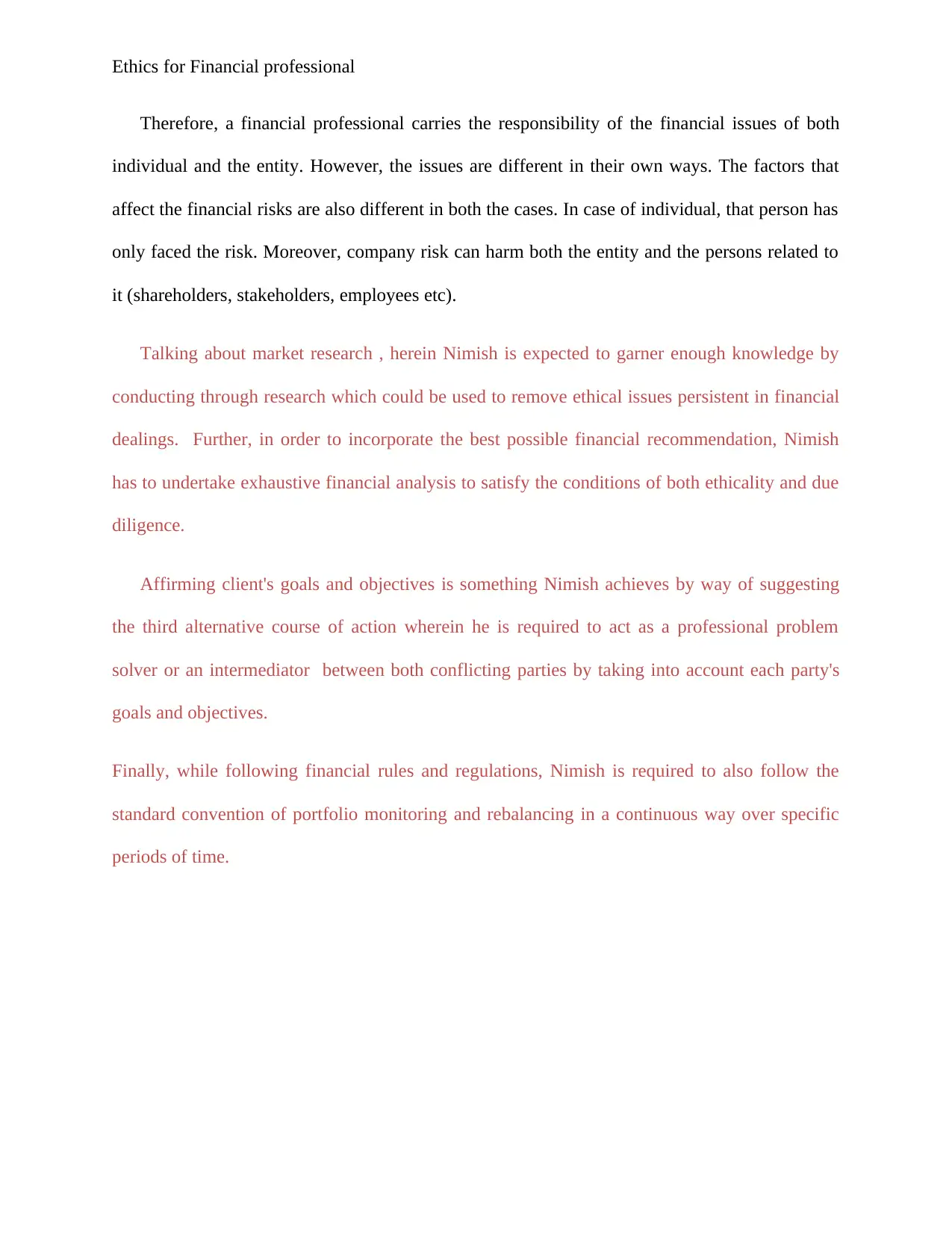
Ethics for Financial professional
Therefore, a financial professional carries the responsibility of the financial issues of both
individual and the entity. However, the issues are different in their own ways. The factors that
affect the financial risks are also different in both the cases. In case of individual, that person has
only faced the risk. Moreover, company risk can harm both the entity and the persons related to
it (shareholders, stakeholders, employees etc).
Talking about market research , herein Nimish is expected to garner enough knowledge by
conducting through research which could be used to remove ethical issues persistent in financial
dealings. Further, in order to incorporate the best possible financial recommendation, Nimish
has to undertake exhaustive financial analysis to satisfy the conditions of both ethicality and due
diligence.
Affirming client's goals and objectives is something Nimish achieves by way of suggesting
the third alternative course of action wherein he is required to act as a professional problem
solver or an intermediator between both conflicting parties by taking into account each party's
goals and objectives.
Finally, while following financial rules and regulations, Nimish is required to also follow the
standard convention of portfolio monitoring and rebalancing in a continuous way over specific
periods of time.
Therefore, a financial professional carries the responsibility of the financial issues of both
individual and the entity. However, the issues are different in their own ways. The factors that
affect the financial risks are also different in both the cases. In case of individual, that person has
only faced the risk. Moreover, company risk can harm both the entity and the persons related to
it (shareholders, stakeholders, employees etc).
Talking about market research , herein Nimish is expected to garner enough knowledge by
conducting through research which could be used to remove ethical issues persistent in financial
dealings. Further, in order to incorporate the best possible financial recommendation, Nimish
has to undertake exhaustive financial analysis to satisfy the conditions of both ethicality and due
diligence.
Affirming client's goals and objectives is something Nimish achieves by way of suggesting
the third alternative course of action wherein he is required to act as a professional problem
solver or an intermediator between both conflicting parties by taking into account each party's
goals and objectives.
Finally, while following financial rules and regulations, Nimish is required to also follow the
standard convention of portfolio monitoring and rebalancing in a continuous way over specific
periods of time.
Paraphrase This Document
Need a fresh take? Get an instant paraphrase of this document with our AI Paraphraser
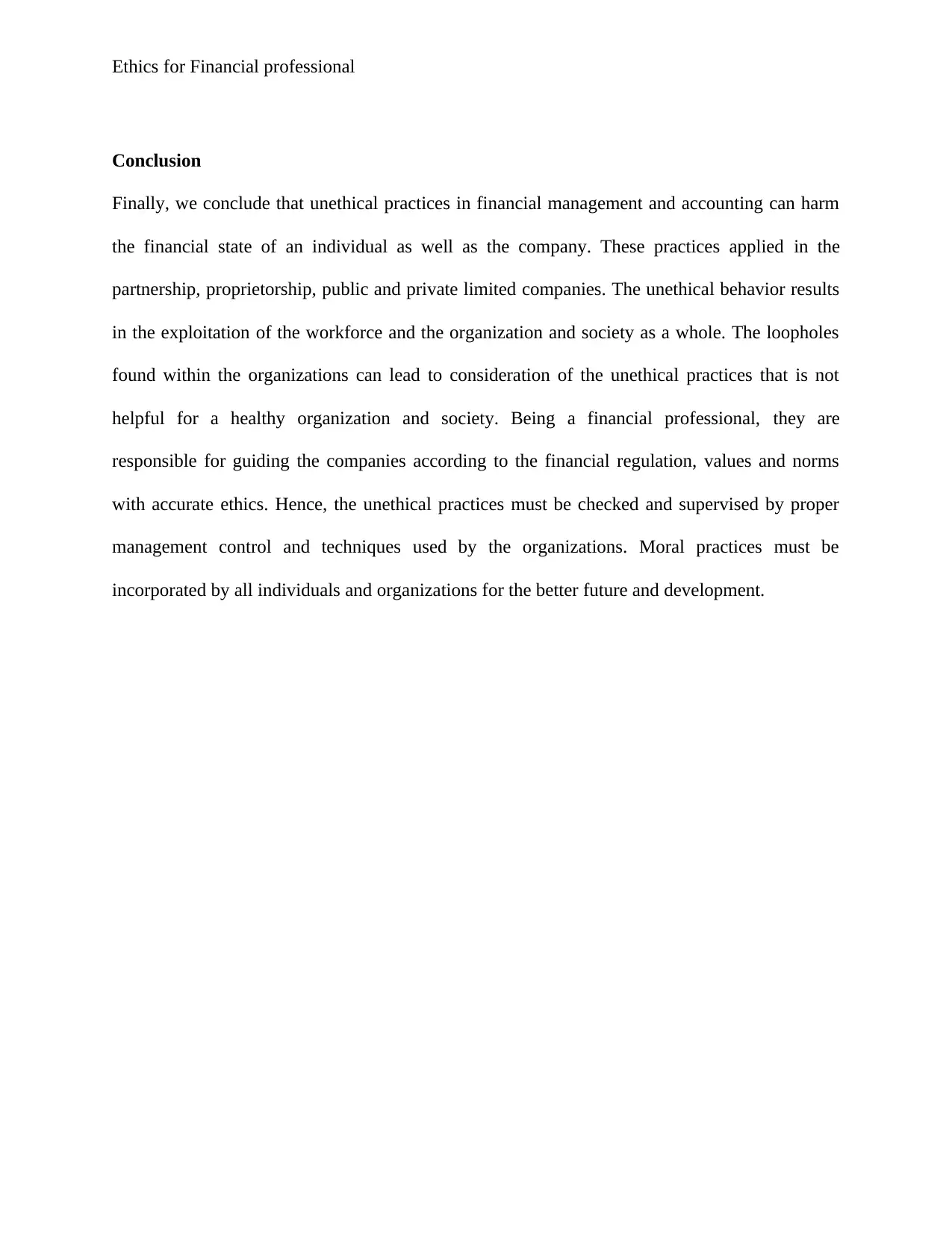
Ethics for Financial professional
Conclusion
Finally, we conclude that unethical practices in financial management and accounting can harm
the financial state of an individual as well as the company. These practices applied in the
partnership, proprietorship, public and private limited companies. The unethical behavior results
in the exploitation of the workforce and the organization and society as a whole. The loopholes
found within the organizations can lead to consideration of the unethical practices that is not
helpful for a healthy organization and society. Being a financial professional, they are
responsible for guiding the companies according to the financial regulation, values and norms
with accurate ethics. Hence, the unethical practices must be checked and supervised by proper
management control and techniques used by the organizations. Moral practices must be
incorporated by all individuals and organizations for the better future and development.
Conclusion
Finally, we conclude that unethical practices in financial management and accounting can harm
the financial state of an individual as well as the company. These practices applied in the
partnership, proprietorship, public and private limited companies. The unethical behavior results
in the exploitation of the workforce and the organization and society as a whole. The loopholes
found within the organizations can lead to consideration of the unethical practices that is not
helpful for a healthy organization and society. Being a financial professional, they are
responsible for guiding the companies according to the financial regulation, values and norms
with accurate ethics. Hence, the unethical practices must be checked and supervised by proper
management control and techniques used by the organizations. Moral practices must be
incorporated by all individuals and organizations for the better future and development.
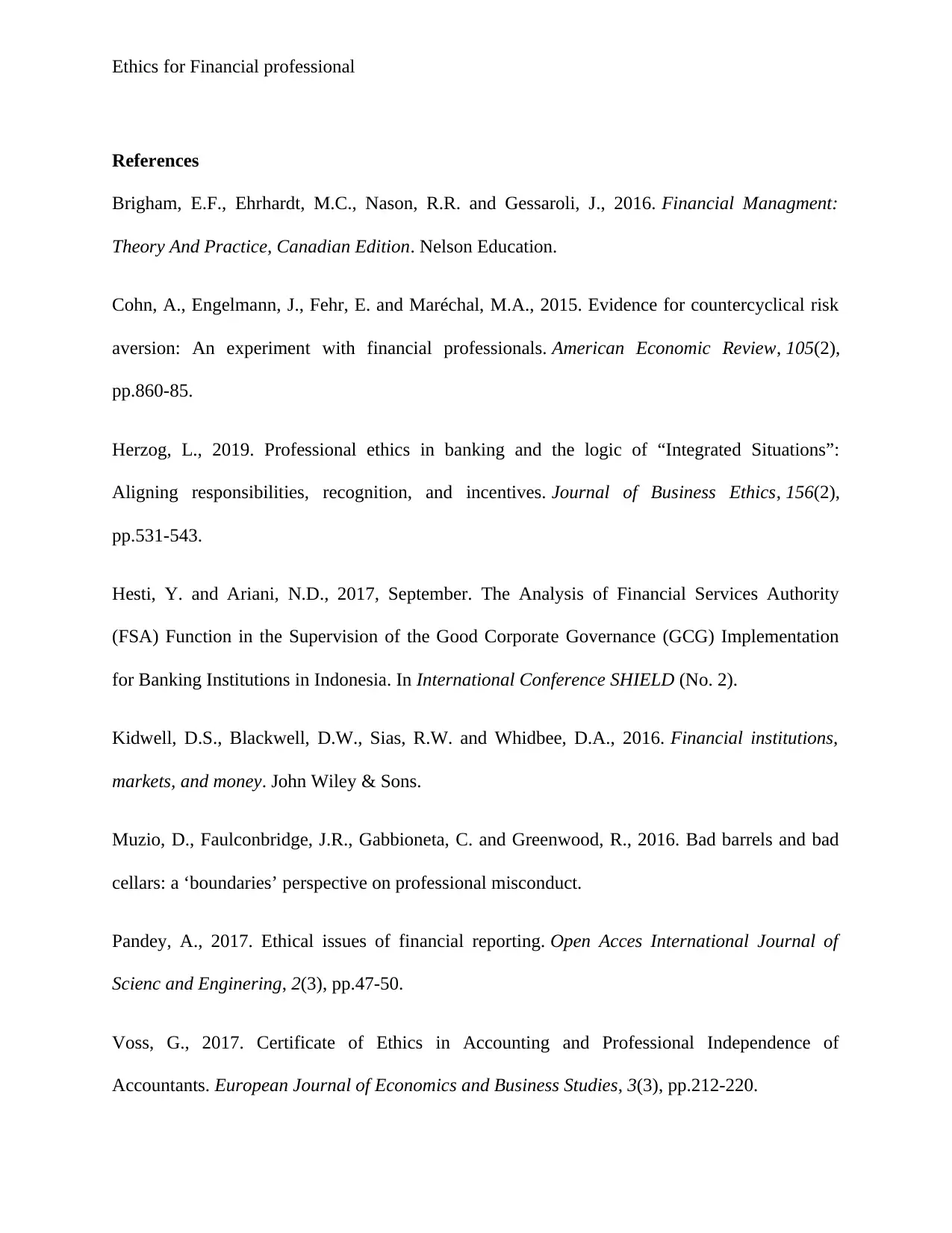
Ethics for Financial professional
References
Brigham, E.F., Ehrhardt, M.C., Nason, R.R. and Gessaroli, J., 2016. Financial Managment:
Theory And Practice, Canadian Edition. Nelson Education.
Cohn, A., Engelmann, J., Fehr, E. and Maréchal, M.A., 2015. Evidence for countercyclical risk
aversion: An experiment with financial professionals. American Economic Review, 105(2),
pp.860-85.
Herzog, L., 2019. Professional ethics in banking and the logic of “Integrated Situations”:
Aligning responsibilities, recognition, and incentives. Journal of Business Ethics, 156(2),
pp.531-543.
Hesti, Y. and Ariani, N.D., 2017, September. The Analysis of Financial Services Authority
(FSA) Function in the Supervision of the Good Corporate Governance (GCG) Implementation
for Banking Institutions in Indonesia. In International Conference SHIELD (No. 2).
Kidwell, D.S., Blackwell, D.W., Sias, R.W. and Whidbee, D.A., 2016. Financial institutions,
markets, and money. John Wiley & Sons.
Muzio, D., Faulconbridge, J.R., Gabbioneta, C. and Greenwood, R., 2016. Bad barrels and bad
cellars: a ‘boundaries’ perspective on professional misconduct.
Pandey, A., 2017. Ethical issues of financial reporting. Open Acces International Journal of
Scienc and Enginering, 2(3), pp.47-50.
Voss, G., 2017. Certificate of Ethics in Accounting and Professional Independence of
Accountants. European Journal of Economics and Business Studies, 3(3), pp.212-220.
References
Brigham, E.F., Ehrhardt, M.C., Nason, R.R. and Gessaroli, J., 2016. Financial Managment:
Theory And Practice, Canadian Edition. Nelson Education.
Cohn, A., Engelmann, J., Fehr, E. and Maréchal, M.A., 2015. Evidence for countercyclical risk
aversion: An experiment with financial professionals. American Economic Review, 105(2),
pp.860-85.
Herzog, L., 2019. Professional ethics in banking and the logic of “Integrated Situations”:
Aligning responsibilities, recognition, and incentives. Journal of Business Ethics, 156(2),
pp.531-543.
Hesti, Y. and Ariani, N.D., 2017, September. The Analysis of Financial Services Authority
(FSA) Function in the Supervision of the Good Corporate Governance (GCG) Implementation
for Banking Institutions in Indonesia. In International Conference SHIELD (No. 2).
Kidwell, D.S., Blackwell, D.W., Sias, R.W. and Whidbee, D.A., 2016. Financial institutions,
markets, and money. John Wiley & Sons.
Muzio, D., Faulconbridge, J.R., Gabbioneta, C. and Greenwood, R., 2016. Bad barrels and bad
cellars: a ‘boundaries’ perspective on professional misconduct.
Pandey, A., 2017. Ethical issues of financial reporting. Open Acces International Journal of
Scienc and Enginering, 2(3), pp.47-50.
Voss, G., 2017. Certificate of Ethics in Accounting and Professional Independence of
Accountants. European Journal of Economics and Business Studies, 3(3), pp.212-220.
⊘ This is a preview!⊘
Do you want full access?
Subscribe today to unlock all pages.

Trusted by 1+ million students worldwide
1 out of 13
Related Documents
Your All-in-One AI-Powered Toolkit for Academic Success.
+13062052269
info@desklib.com
Available 24*7 on WhatsApp / Email
![[object Object]](/_next/static/media/star-bottom.7253800d.svg)
Unlock your academic potential
Copyright © 2020–2026 A2Z Services. All Rights Reserved. Developed and managed by ZUCOL.





